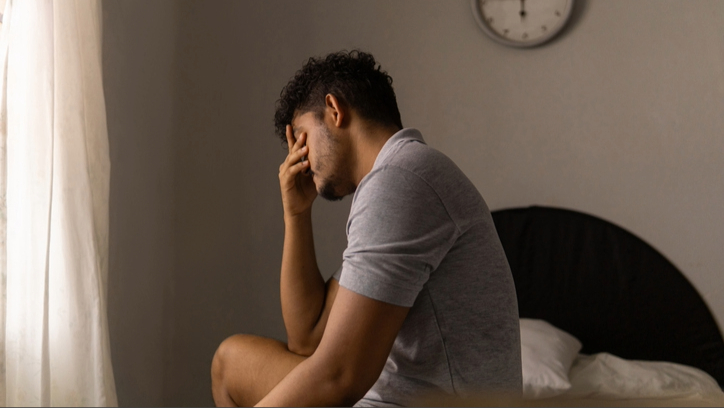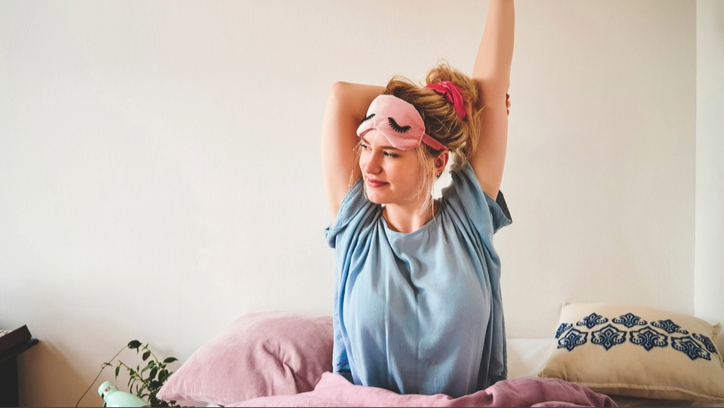Change this setting on your phone for better sleep and brain health
This phone hack can give you 17 more minutes of sleep

From doom scrolling eating into sleep time to blue light suppressing sleepiness, it's well known that phones wreak havoc on our sleep but they can also decay our brains. According to recent studies, keeping your phone's internet connection switched off could bag you an extra 17 minutes of sleep a night and boost your brain health.
Thanks to the glymphatic system, your brain cleanses itself of waste products overnight. However, when a phone addiction means you don't get adequate restorative sleep, these toxins can build up, accelerating the brain aging process and impairing cognitive function.
The new research explored whether people got more sleep when they did not have access to mobile internet, which could in turn improve psychological health. Here's what they found...
Key takeaways
- Without internet access, people averaged about 17 more minutes of sleep per night
- 91% of participants' health improved in at least one measure
- People without internet spent more time socializing and exercising
Researchers from multiple universities across America and Canada worked with 467 iPhone users with the average age of 32 to test how removing constant internet access would affect their daily lives.
Participants installed an app that blocked mobile internet while still allowing calls and texts. This way, phones remained useful for basic communication but lost their ability to provide endless scrolling, social media, and constant online access.
After cutting off their internet access, 91% of participants improved in at least one measure of health. These people spent more time socializing in person, exercising and being in nature, all of which helped improve sleep. In fact, it improved sleep so much so that the participants averaged an extra 17 minutes of sleep a night.

Participants without internet access for two weeks also performed better on attention tests, showing improvements comparable to reversing 10 years of age-related cognitive decline.
Sign up to get the BEST of Tom's Guide direct to your inbox.
Get instant access to breaking news, the hottest reviews, great deals and helpful tips.
But this isn't the first time poor sleep has been associated with accelerated brain aging. Research from 2024 by the BBC highlighted that people with two to three poor sleep characteristics showed a brain age that was 1.6 years older than their actual age.
Additionally, people with more than 3 poor sleep characteristics showed a brain age 2.6 years older than their chronological age. This study involved participants with an average age of 40 over a 15 year period and defined as short sleep duration, bad sleep quality and insomnia complaints.
How does poor sleep age the brain?
Not getting the rest you need puts stress on the body and mind, which can accelerate the aging process. Poor sleep impacts many processes in the brain. It disrupts the glymphatic system, impairs the creation of new brain cells, causes gray matter loss, damages white matter and increases inflammation.
But what does all this mean? Science says poor sleep can age your brain faster by disrupting the brain's natural cleansing process during sleep, hindering the removal of toxins that build up while awake. A 2022 study by British researchers shows this can lead to changes in brain structure like reduced gray matter volume. This impairs the ability to form new memories and neural connections, ultimately contributing to cognitive decline and accelerated brain aging.
How else does poor sleep affect brain health?
Alongside accelerating brain aging, lack of sleep also causes more immediate, noticeable cognitive problems. You're probably aware of how you feel irritable after a bad night's sleep. You might struggle to concentrate at work, become easily forgetful, have slower reaction times, or have difficulty regulating your emotions and making decisions. Additionally, poor sleep is known to exacerbate mental health problems like anxiety and depression.
Another study published by the National Institutes of Health linked insufficient sleep earlier in life to later dementia risk. People in their 50s and 60s who slept less than seven hours per night were 30% more likely to be diagnosed with dementia later.
3 ways to take care of your brain through sleep

Maintain a regular sleep schedule
Waking up and going to sleep at the same time each day regulates your internal clock. This helps your body know when to release sleep hormones (melatonin) and wake hormones (cortisol) so you fall asleep and wake up easier, sleeping more efficiently and getting better quality sleep.
A calming nighttime routine can help you establish this schedule. Your bedtime routine should follow certain steps including activities you find relaxing, be that reading, meditating or journaling. A warm bath or a sleep-inducing drink are also great additions to this routine, helping you wind down at bedtime and fall asleep fast.
Sleep in ideal conditions
Temperature and light are two of the main stimuli for the circadian rhythm. While light and warm temperature tells the body to wake up, darkness and a cool temperature signal the body to wind down for sleep.
Therefore, a cool dark bedroom, along with the best mattress for your sleep style and needs, is ideal for inducing sleep and keeping you asleep through the night. If you tend to sleep hot, one of this year's best cooling mattresses will help keep you cool. Additionally, if light pollution tends to seep into your bedroom, it's worth investing in some blackout curtains.
Get ample daylight
Spending time outdoors exposing ourselves to natural daylight can have a positive impact on our sleep. Light boosts energy levels in the day, benefitting your circadian rhythm. Meanwhile your body produces vitamin D when exposed to sunlight, which research shows is a crucial vitamin for sleep, staving off sleep deprivation.

Eve is a PPA-accredited journalist with an MA in Magazine Journalism from Cardiff University. She is a Sleep Staff Writer at Tom’s Guide and has four years’ experience writing health features and news. She is particularly interested in the relationship between good sleep and overall health. At Tom’s Guide Eve is responsible for coverage and reviews of sleep tech and is our smart and cooling mattress specialist, focussing on brands such as Eight Sleep and Sleep Number. She also covers general mattress reviews, seeks out the best deals to produce tried-and-tested buyer's guides for sleep accessories and enjoys writing in-depth features about sleep health. She has been involved in rigorous testing procedures for mattress reviews in our Sleep Studio and has interviewed experts including sleep doctors and psychologists. When not covering sleep at Tom's Guide, Eve enjoys writing about health and fitness, food and culture.
You must confirm your public display name before commenting
Please logout and then login again, you will then be prompted to enter your display name.
